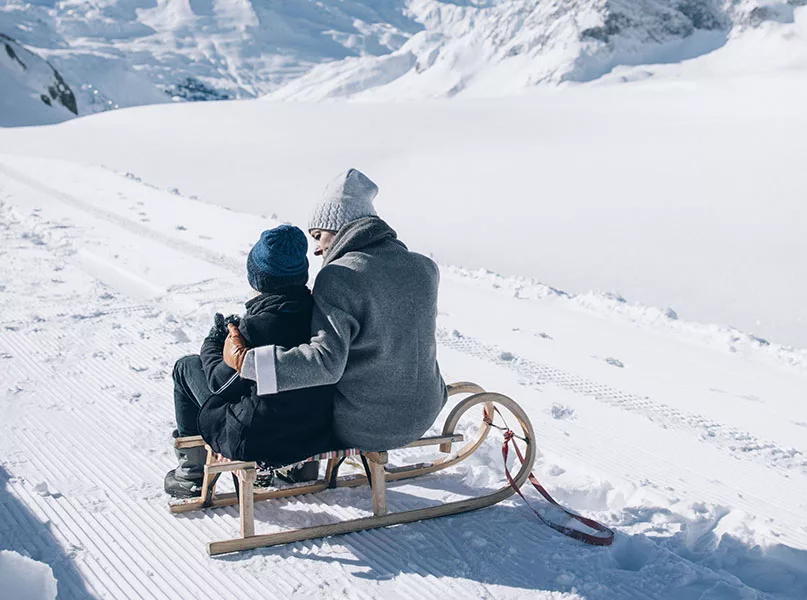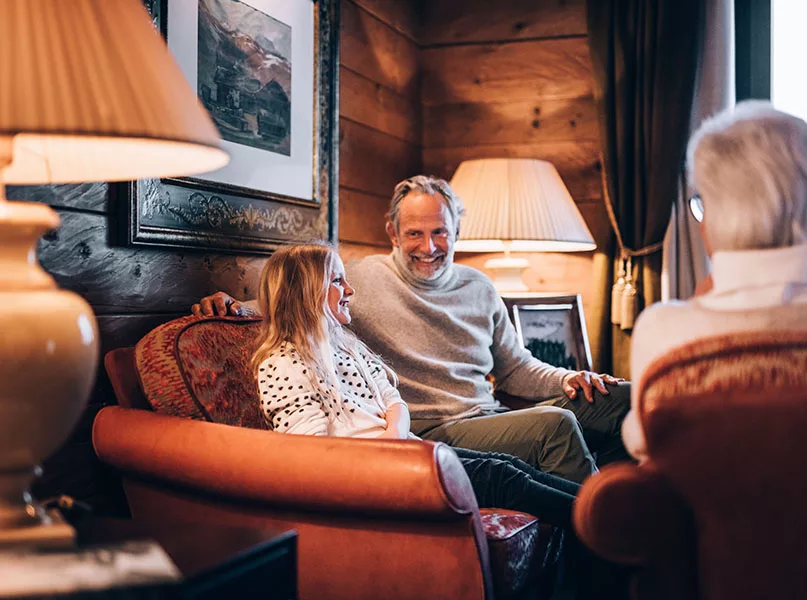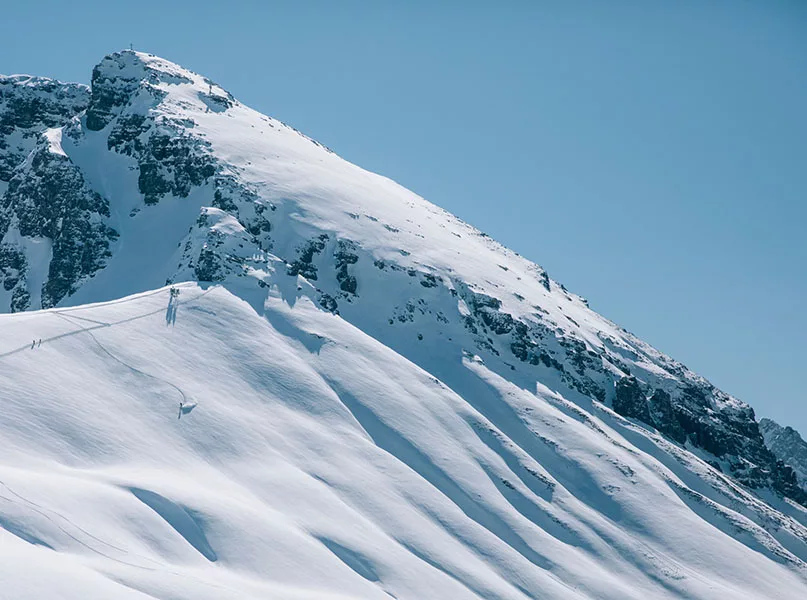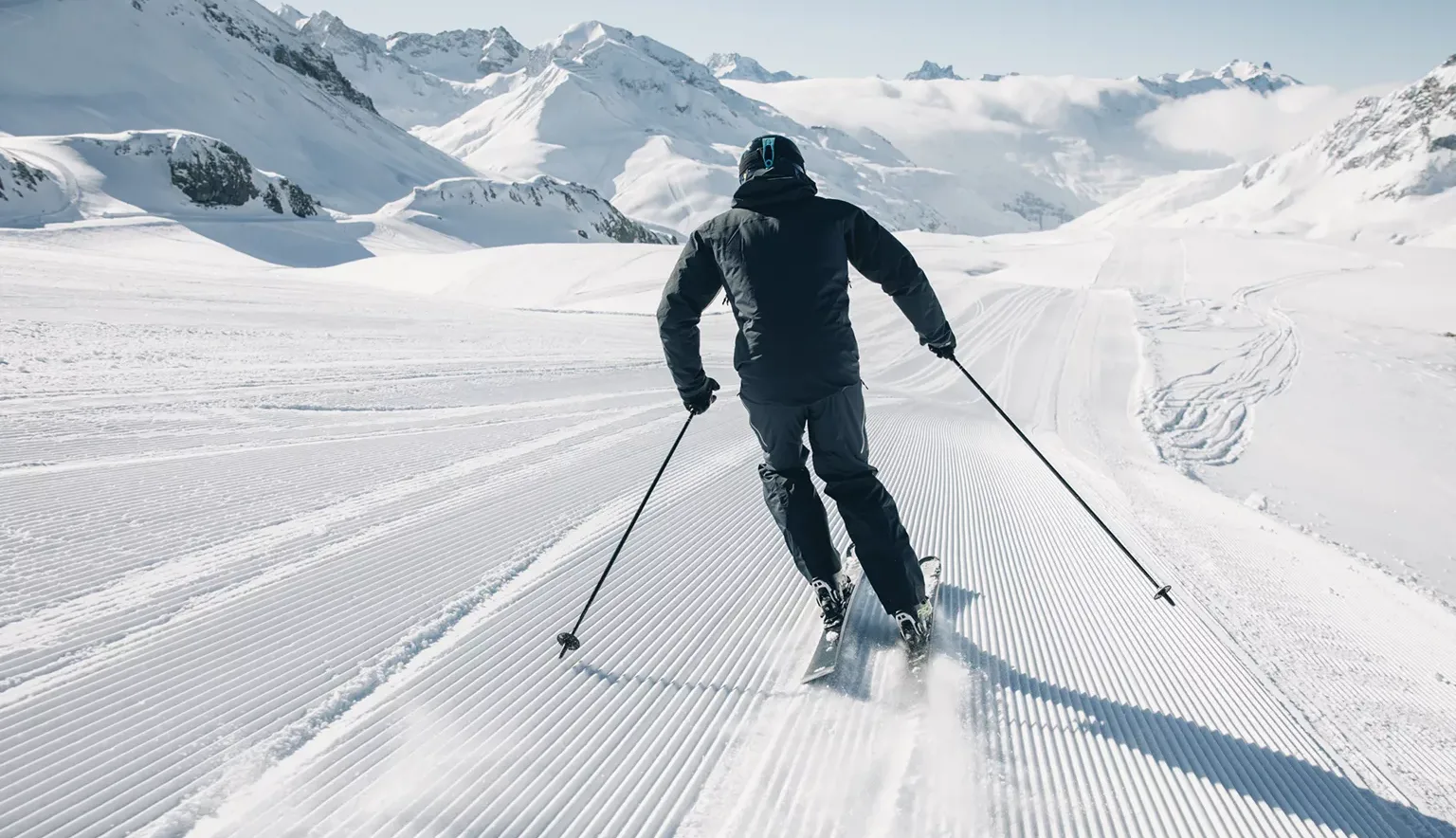A winter wonderland surrounded by snow-covered mountains, Lech Zürs is the ideal starting point for adventure, enjoyment, and relaxation. We speak to Hermann Fercher, Tourism Director and CEO of the Lech Zürs Tourist Board, about the region’s unique character.
Q&A WITH HERMANN FERCHER, TOURISM DIRECTOR AND CEO, LECH ZÜRS TOURIST BOARD
Firstly, can you talk us through the evolution of Lech Zürs as a destination?
Hermann Fercher, Tourism Director and CEO (HF): Within a few decades, Lech Zürs has managed to evolve from a mountainside farming village into an international tourist hotspot, without losing any of its essential cultural values or village character. The naturally grown destination owns a maximum of 10,000 beds and is characterised by a variety of accommodation establishments – from 5-star hotels to fine, small guesthouses. Lech Zürs also benefits from the brand image of the Arlberg, which became world-famous through its skiing history and pioneering achievements. The sporting successes of the likes of Trude Jochum Beiser, Egon Zimmermann, and Patrick Ortlieb have generated notoriety, both in the past and now. Lech Zürs has been the backdrop for world-famous movies and a popular retreat for celebrities from the film and music business. Public figures help to shape the international brand image of Lech Zürs and attract media representatives from around the world.
What are your organisation’s current goals and how do you plan to achieve them?
HF: The Lech Zürs Tourist Board focuses on internationalisation and the “Refuge for Private Luxury Moments” brand positioning, which stands for a place of retreat where you can find real privacy and spend high-quality time with family and friends. This is noticeable once you visit Lech Zürs, setting the destination apart from other top players in the region.
Why, in your opinion, should someone visit Lech, and what for you defines the village?
HF: Oscar Wilde once said: “I’m a man of simple tastes – I’m always satisfied with the best.” In Lech Zürs, it’s the attention to detail that makes the sweet difference.
Arlberg is considered the birthplace of alpine skiing – an historic meeting place in the heart of the Alps.
Lech Zürs has always been a hub at the intersection of winter sports, art, and culture. A symbol of this is the White Ring, the legendary ski circuit and one of the world’s longest ski races. Other notable pursuits include heli-skiing, where your heart beats faster the higher you climb as the helicopter lifts off. Elsewhere, an underground walk-in installation by world-famous artist James Turrell focuses the perception of light and space. Freedom of thought and a passion for culture are essential components to Arlberg’s white seasons. The calendar of events at Lech Zürs encompasses everything from Arlberg Weinberg to the Tanzcafé Arlberg Music Festival. A lot of space and time is dedicated to the region’s cultural history and contemporary creativity. Lech Zürs is its own little world, whose size cannot be measured in square metres.
Summer in Lech Zürs is a voyage of discovery juxtaposed between high mountains and high culture, adventure and gourmet food, thrills and spills, and peace and quiet. Majestic alpine peaks tower over everything with jagged rocks and green forests, lending an air of magic that fascinates and inspires. Lech Zürs is a perfect setting for intellectual exchange between creatives, philosophers, and medical experts, a powerhouse for musicians, painters, and writers, and a place of longing. Summer here has so much to offer. Balls fly at golf tournaments and on the tennis courts, tyres squeal at the vintage car rallies, and feet dance at village festivals and concerts. Sometimes, just the cool water of the mountain lakes or forest swimming pools are enough for a happy summer day under the Arlberg sun. More time and more space – that is what Lech Zürs promises its guests year-round. Here, all the colours and fragrances really come into their own in spring and summer.
As a culturally vibrant destination, the area attracts people from all over the world who appreciate the quality of the ski resort, in addition to the hospitality and service quality in its restaurants and hotels.

What does Lech Zürs offer in terms of sustainable or eco-friendly travel experiences? Do you have any goals in place regarding this?
HF: For decades, Lech Zürs has been a pioneer of sustainable development, benefitting both mankind and nature.
Our aim is, and remains, the preservation of the unique character of the locality, and the protection of its environment in the long term. To this end, strict building regulations and thorough planning carry this vision forward. One thing remains true: less is more. By limiting ourselves to just 10,000 guest beds, Lech Zürs is committed to consciously promoting quality tourism. In doing so, we conserve resources, maintain the natural landscape, and promote agriculture. It’s nice to know that miracles still happen in the lofty heights of the Arlberg.
Renewable energy sources fuel biomass heating plants in Lech, Zürs, Oberlech, and Zug, producing enough energy to supply almost 100 percent of all households and businesses with warm, cosy heat. The root of this concept, which is admired nationwide, dates back to the 20th century.
Lech Zürs’ public transport system has been future-ready since the 1990s; the local bus system kicked off in the summer of 1997, with four buses servicing two lines. Within just two-and-a-half years, the “Blue Fleet”, which is now part of the fabric of the town, had already transported more than one million passengers. To this day, this comfort-oriented service continues to shape the village’s mobility. As a result, more and more locals and guests are leaving their cars at home and instead opting for the free ski bus.
Lech Zürs has also been at the cutting edge of electromobility. E-bikes and e-scooters have been available to rent since the summer of 2011. One year later, the first e-filling station opened its doors. The 2018/19 winter season was a groundbreaking milestone: In cooperation with BMW and Vorarlberger Kraftwerke AG, Europe’s first fully electric “Green Garage” was constructed. One year later, electromobility came full circle as the Blue Fleet tested an electric bus for public transport. All aboard! Notably, the future of mobility in Lech Zürs is emissions-free.
Since the spring of 2020, Ski-Zürs-AG has operated all cable cars, chairlifts, mountain restaurants, and snow-making facilities with 100 percent TÜV-certified green electricity. With this clean energy solution, Ski-Zürs-AG eliminates around 1,265 tonnes (t) of CO2 emissions and radioactive waste and makes an important contribution to protecting the environment, whilst fulfilling Vorarlberg’s aspirations for energy autonomy.
In Oberlech, this vision has been a reality since 1997 thanks to a concept unique in Europe. While winter guests float emission-free from Lech to Oberlech via cable car, a green tunnel system whisks guests to their hotels. From December to April, this sustainable transport system ensures that the entire district is free from emissions, traffic, and noise. Moreover, goods heading to and from the hotels are transported exclusively by electric cars.
Lech’s ski lifts are also innovative as they provide a useful agricultural link. Since 2008, Scottish Highland cattle have been bred to graze on steep slopes to prevent avalanches. The Schottenhof farm in Oberlech, built at an altitude of 1,760 metres (m) above sea level, is regarded as an ultra-modern alpine farm, showcasing future-oriented methods. In the mountains, the cycle of sustainability comes full circle as meat produce from of highland cattle is used in local gastronomy.
The local restaurants and their guests appreciate milk sourced from Lech. The same goes for yoghurt, cream cheese, or the hay milk ice cream made by the local baker. Whether as producers of regional delicacies or managers of the region’s characteristic cultural landscape, Lech’s farmers are potentially the most impressive representatives of sustainability in action.
The recipes of award-winning chefs feature regional ingredients, butchers and bakers know their local suppliers by name, and alpine huts cater to individual guests instead of attempting to satisfy the masses. In Lech Zürs, sustainability is less about energy figures and emission values, and more about how people meaningfully do business and meet each other.

Are you optimistic about the future of the tourism industry in Lech Zürs, particularly with regard to bouncing back from the COVID-19 pandemic?
HF: With the development of the Lechwelten Convention Centre, Lech Zürs will be able to offer a well-rounded portfolio from June 2024. Lech is a global village, with guests from all over the world. The events that take place here underscore the cosmopolitan nature of the location and its drive to provide a worthy venue for ideas, discourse, and innovation. With years of experience in catering to guests from all over the world, Lech meets the highest standards.
Are there any particularly unique experiences or underrated activities that Lech has to offer, which are perhaps lesser known? This could be a scenic natural attraction, restaurant or hotel that you would personally recommend.
HF: The Skyspace-Lech, by light artist James Turrell, is a largely underground structure that blends naturally into the landscape. The Oval Main Room has an oval opening in the ceiling, whilst a circular bench, like the floor, is lined with black granite. After dusk falls, the light installation in the room bathes the walls and ceilings in moving, coloured lights, so that the spatial structure, which was previously perceived as clean, seems to dissolve.
Per capita, Lech Zürs boasts the world’s highest density of award-winning restaurants. Though at first glance Arlberg may seem cosy and small, make no mistake – top-class cuisine awaits.
Since the golf course in Zug opened in 2016, the dream of golfing in crystal-clear mountain air on the Arlberg has come reality. Stylishly and harmoniously embedded within the alpine landscape of the Zugertal valley, the sophisticated nine-hole, handicap-friendly course boasts thrilling new vistas of surrounding pristine nature at every tee.




























